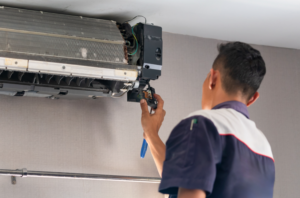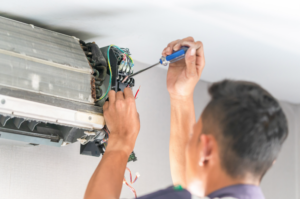Air Conditioning Engineers
- Home
- Air Conditioning Engineers
PROFESSIONAL AIR CONDITIONING ENGINEERS
#1 FOR AIR CONDITIONING & HVAC ENGINEERS

Air-Con Engineers | We understand that a comfortable and well-regulated indoor climate is essential for enjoying the beautiful Costa del Sol environment. Our air conditioning installation services ensure that your home or business remains cool, comfortable, and energy-efficient at all times. Our team of air conditioning engineers uses the latest equipment and techniques to provide comprehensive installation services, including system design, unit placement, and optimal configuration.
Our experienced air conditioning engineers conduct thorough inspections and perform maintenance tasks such as system checks and performance evaluations to ensure your air conditioning units are functioning optimally. With our reliable and professional services, you can enjoy a perfectly climate-controlled environment without the hassle of dealing with complex installations or regular upkeep. Trust Complete Property Solutions to deliver exceptional air conditioning solutions that enhance your indoor comfort and energy efficiency.
Read Our Reviews:

NEED AN AIR CONDITIONING ENGINEER?
- Expert Tradesman
- Tailored Solutions
- Comprehensive Support
- Air-Con Supplied
- Air-Con Installed
- Air-Con Maintained
- Systems Supported
"You can trust us and our tradespeople"

"Excellent work, great bunch of guys. Richard showed us through every step of the way. 100% fantastic." Mr & Mrs MacDonald on 3rd April 2024
"Fantastic work and a great fantastic team. Urgent work was needed before Christmas and they stepped up to the plate. I would highly recommend Complet Property Solution Mr Philipson on 2nd December 2023

Satisfaction guarantee

Quality Service Every Time

Excellent Communication

Swift Response & Fix Times
Air Conditioning & HVAC Engineers
Air-Con Engineer Service Areas in Malaga (Costa del Sol), Cadiz & Gibraltar: Malaga City, Marbella, Torremolinos, Fuengirola, Benalmadena, Estepona, Manilva, Sotogrande, Pueblo Nuevo, San Roque, Los Barrios, Jerez & More…

Air Conditioning Engineers | With more than 20 years of experience, Complete Property Solutions provides a comprehensive range of quality air conditioning services to clients in the Costa del Sol area. We are your one-stop solution for keeping cool when the temperature rises and controlling your indoor environment, whatever the weather.
Our Services
We offer air conditioning solutions for both domestic and commercial projects. Whether it’s a restaurant, office, villa, or apartment, we take the time to listen to your needs and provide bespoke recommendations that suit your property and budget. Our extensive knowledge ensures great results every time.
Expert Installation
Complete Property Solutions is your trusted expert in air conditioning installation in Spain. We are dedicated to providing top-tier installation services for both domestic and small commercial clients, ensuring that each system is tailored to meet your specific needs. Our team of highly trained professionals brings over a decade of experience, guaranteeing meticulous and efficient installations that maximise performance and energy efficiency.
Our expert air conditioning engineers are fully qualified and committed to installing affordable products without compromising on quality. We bring you exceptional systems from leading manufacturers such as Fujitsu, Panasonic, Mitsubishi, and Samsung. We’ll discuss the available options in terms of cost, features, and functionality, giving you all the information you need to make an educated decision on your air conditioning installation.
Comprehensive Maintenance and Repair
Our comprehensive service extends beyond installation to include annual maintenance and prompt repairs, ensuring your system operates smoothly and effectively at all times. Whether you need a full design and installation service or have an existing system that needs repairing or servicing, we can help. No job is too big or small for our team. With 20 years of experience in Spain, we’ve earned a strong reputation for reliability and a professional approach.
We offer free advice, recommendations, and a full site survey and quote. If you have an existing system that is underperforming, we’ll assess its condition and advise on the most cost-effective solution, prioritising repairs over replacements whenever possible.
Personalised Consultations and Customer Care
At Complete Property Solutions, we prioritise customer satisfaction, providing personalised consultations and free site surveys to determine the most suitable air conditioning solutions for your space. As a family-owned and operated business, we are committed to delivering exceptional service characterised by reliability, honesty, and value for money.
For your complete comfort and peace of mind, should your system fail, we’ll be there as soon as possible to help, even outside normal operating hours if necessary. We work with the utmost respect for your property and belongings, keeping things safe and tidy during installation. Your satisfaction is our number one priority. If you have any specific requirements, please let us know, and we’ll be as flexible as possible to accommodate your needs. Also see: Air Conditioning Installation
Cost Of An Air Conditioning Systems
When considering air conditioning installation, it’s important to understand the costs involved. In 2024, the cost of air conditioning systems can vary significantly based on several factors, including the type of system, the size of the space, and the complexity of the installation. Here’s a detailed breakdown of the expected costs to help you plan your investment.
Monoblock Air Conditioners: These are typically the most affordable option. Portable or mobile air conditioners generally cost between €300 and €600, depending on the capacity and features. Floor-mounted and wall-mounted monoblock units are slightly more expensive, ranging from €500 to €1,000 due to their higher capacity and dual-functionality (cooling and heating).
Split Air Conditioning Systems: These systems are more expensive but offer greater efficiency and better aesthetics. Wall-mounted split air conditioners range from €800 to €2,500, depending on the brand, capacity, and additional features such as smart controls and air purification. Ceiling cassette air conditioners, suitable for larger spaces, cost between €1,500 and €3,500. Ceiling-suspended and duct-mounted air conditioners fall in a similar range, usually between €1,800 and €4,000. Floor-mounted split air conditioners, which include column and cabinet styles, range from €1,000 to €2,500.
Multi-Split Air Conditioning Systems: Multi-split systems, which allow multiple indoor units to be connected to a single outdoor unit, can be more costly. Prices typically start at around €2,500 and can go up to €7,000 or more, depending on the number of indoor units and the complexity of the installation. This option is ideal for larger homes or offices requiring climate control in multiple rooms.
Installation Costs: The cost of installing air conditioning systems also varies based on the type and complexity of the system. For monoblock systems, installation costs are minimal, often only requiring a few hundred euros for setup. Split systems, which require more complex installations involving refrigerant lines and electrical work, typically cost between €500 and €1,500. Multi-split systems, due to their complexity, can have installation costs ranging from €1,000 to €3,000.
Additional Costs: When budgeting for air conditioning, consider additional costs such as maintenance, potential repairs, and energy consumption. Regular maintenance can help extend the life of your system and prevent costly repairs, typically costing between €100 and €300 annually. High-efficiency units may have higher upfront costs but will save on energy bills over time, making them a cost-effective choice in the long run.
Choosing the Right Air Conditioning System
Speak to our professional HVAC engineers: When selecting an air conditioning system, consider the cooling capacity needed, the type of unit that best suits your space, and other factors such as physical size, functionality, noise level, aesthetics, and cost. For homes and small offices, wall or floor-mounted split systems are usually the best choice due to their functionality and quiet operation. If external units are not an option, consider monoblock systems. For larger spaces or multiple rooms, multi-split or ducted systems provide comprehensive solutions.
Join Complete Property Solutions
 We select the most qualified, professional tradesman for our clients and
We select the most qualified, professional tradesman for our clients and delivering exceptional service is our number one priority. If you feel you fit the bill, please click “Join Us“ and complete our enrolment form and we’ll contact you back.
delivering exceptional service is our number one priority. If you feel you fit the bill, please click “Join Us“ and complete our enrolment form and we’ll contact you back.
** Please provide any qualification certificates & tradesman insurance details **
 Last updated
Last updatedBy Administration
REQUEST AN AIR CONDITIONING ENGINEER
 Air conditioning engineer?
Air conditioning engineer?Services
- Plumbers
- Electricians
- Carpenters & Joiners
- Locksmiths
- Builders & Bricklayers
- Plasterers
- Glaziers
- Roofers
- Fencers
- Landscape Gardeners
- HVAC Engineers
- Air Conditioning Engineers
- Solar Installers
Common Jobs
- Tripping Circuit Breaker Issues
- Electrical Surges or Dips
- Fixing Power Sockets / Switches
- Property Re-Wiring
- Installing Property Alarms
- Installing Security / Outside Lighting
- Testing Electrical Equipment
- Air Conditioning Installations
- Air Conditioning Servicing
- Solar Panel Installation
- Installing Batteries / UPS's


At Complete Property Solutions, our air conditioning engineers bring extensive expertise and experience to every project, ensuring top-tier services for both residential and commercial properties.
These highly trained professionals are responsible for the design, installation, and maintenance of air conditioning systems, working with leading brands such as Fujitsu, Mitsubishi, and Samsung. They conduct thorough site surveys and provide detailed consultations to recommend the most suitable systems, ensuring optimal performance and energy efficiency.
Whether it’s a new installation or servicing an existing system, our engineers handle everything from system layout and unit placement to diagnosing issues and performing routine maintenance and repairs.
Our HVAC engineers are specialists in heating, ventilation, and air conditioning, playing a crucial role in maintaining a comfortable indoor environment. They design, install, and maintain HVAC systems in residential, commercial, and industrial settings, collaborating with architects and adhering to industry standards to ensure efficiency and compliance.
HVAC engineers at Complete Property Solutions also focus on energy-saving measures and optimising systems to improve indoor air quality and comfort. With a commitment to customer satisfaction, they provide reliable, honest, and professional services, making us a trusted partner for all your HVAC needs. Whether you require system design, installation, or emergency repairs, our HVAC engineers are equipped to meet your needs with expertise and dedication.
Top 10 Self-Maintenance Tips for Your Air Conditioning System
 Keeping your air conditioning system in good condition doesn’t just improve comfort, it also saves money, reduces energy use, and extends the life of your equipment. While professional servicing is essential, there are many simple steps you can take yourself to keep your system running smoothly between visits. From cleaning filters and checking drain lines to monitoring thermostat performance, these small but effective measures can make a big difference. Below, a professional air conditioning engineer, has put together the top ten self-maintenance tips every homeowner should follow to keep their air conditioning efficient, reliable, and ready for the hottest days.
Keeping your air conditioning system in good condition doesn’t just improve comfort, it also saves money, reduces energy use, and extends the life of your equipment. While professional servicing is essential, there are many simple steps you can take yourself to keep your system running smoothly between visits. From cleaning filters and checking drain lines to monitoring thermostat performance, these small but effective measures can make a big difference. Below, a professional air conditioning engineer, has put together the top ten self-maintenance tips every homeowner should follow to keep their air conditioning efficient, reliable, and ready for the hottest days.
Clean or Replace Air Filters Regularly
 Filters trap dust, dirt, and allergens, but when they become clogged, airflow is restricted, and the system must work harder to maintain comfort. Dirty filters reduce efficiency, increase running costs, and compromise indoor air quality. Most manufacturers recommend cleaning or replacing filters every 1 to 3 months, depending on usage. This is one of the simplest yet most effective maintenance tasks you can do yourself. A clean filter helps your air conditioning system run smoothly and prevents unnecessary strain on the components.
Filters trap dust, dirt, and allergens, but when they become clogged, airflow is restricted, and the system must work harder to maintain comfort. Dirty filters reduce efficiency, increase running costs, and compromise indoor air quality. Most manufacturers recommend cleaning or replacing filters every 1 to 3 months, depending on usage. This is one of the simplest yet most effective maintenance tasks you can do yourself. A clean filter helps your air conditioning system run smoothly and prevents unnecessary strain on the components.
![]() Check filters every month during peak use
Check filters every month during peak use
![]() Replace disposable filters when visibly dirty
Replace disposable filters when visibly dirty
![]() Wash reusable filters with mild soap and water
Wash reusable filters with mild soap and water
![]() Allow washed filters to dry fully before reinstalling
Allow washed filters to dry fully before reinstalling
![]() Always follow manufacturer guidelines on filter type
Always follow manufacturer guidelines on filter type
Keep Outdoor Units Free from Obstructions
 Your outdoor condenser unit needs proper airflow to operate efficiently. Leaves, grass, and other debris can block ventilation, forcing the unit to work harder and potentially leading to overheating. Keeping at least a metre of clear space around the unit ensures it can release hot air effectively. Regular inspections of the area help prevent performance issues and reduce the risk of long-term damage. A clean and well-ventilated unit also runs more quietly and efficiently.
Your outdoor condenser unit needs proper airflow to operate efficiently. Leaves, grass, and other debris can block ventilation, forcing the unit to work harder and potentially leading to overheating. Keeping at least a metre of clear space around the unit ensures it can release hot air effectively. Regular inspections of the area help prevent performance issues and reduce the risk of long-term damage. A clean and well-ventilated unit also runs more quietly and efficiently.
![]() Check for leaves, weeds, and rubbish around the unit
Check for leaves, weeds, and rubbish around the unit
![]() Maintain at least one metre of clearance on all sides
Maintain at least one metre of clearance on all sides
![]() Trim nearby plants or shrubs regularly
Trim nearby plants or shrubs regularly
![]() Keep the top of the unit clear of debris
Keep the top of the unit clear of debris
![]() Gently clean fins with a soft brush if blocked
Gently clean fins with a soft brush if blocked
Inspect and Clean Condenser Coils
 Condenser coils release heat outdoors, but dirt and dust build-up makes this process less efficient. Dirty coils can cause your air conditioning to overheat, increase energy use, and shorten its lifespan. While annual professional servicing is recommended, you can carry out light cleaning yourself. A gentle hose spray or a coil-cleaning solution helps remove surface grime. Avoid harsh chemicals or high-pressure sprays, as these may damage the delicate fins.
Condenser coils release heat outdoors, but dirt and dust build-up makes this process less efficient. Dirty coils can cause your air conditioning to overheat, increase energy use, and shorten its lifespan. While annual professional servicing is recommended, you can carry out light cleaning yourself. A gentle hose spray or a coil-cleaning solution helps remove surface grime. Avoid harsh chemicals or high-pressure sprays, as these may damage the delicate fins.
![]() Turn off power before cleaning coils
Turn off power before cleaning coils
![]() Use a soft brush to loosen surface dirt
Use a soft brush to loosen surface dirt
![]() Hose down gently, avoiding direct pressure
Hose down gently, avoiding direct pressure
![]() Purchase coil cleaner spray for deeper cleaning
Purchase coil cleaner spray for deeper cleaning
![]() Schedule professional coil servicing annually
Schedule professional coil servicing annually
Check and Clear the Drain Line
 Air conditioners produce condensation, which exits through a drain line. Over time, algae, mould, or dirt can block this pipe, causing water leaks indoors. Clearing the drain line regularly prevents flooding, foul smells, and water damage. A simple flush with a mixture of water and vinegar can help keep the line clean. Monitoring for standing water near the indoor unit is also an early warning sign of a blockage.
Air conditioners produce condensation, which exits through a drain line. Over time, algae, mould, or dirt can block this pipe, causing water leaks indoors. Clearing the drain line regularly prevents flooding, foul smells, and water damage. A simple flush with a mixture of water and vinegar can help keep the line clean. Monitoring for standing water near the indoor unit is also an early warning sign of a blockage.
![]() Inspect the drain line every few months
Inspect the drain line every few months
![]() Flush with vinegar solution to prevent algae
Flush with vinegar solution to prevent algae
![]() Look for standing water near indoor units
Look for standing water near indoor units
![]() Use a wet/dry vacuum for stubborn blockages
Use a wet/dry vacuum for stubborn blockages
![]() Call a professional if leaks persist
Call a professional if leaks persist
Monitor Thermostat Performance
 Your thermostat controls the comfort of your home, but if it isn’t calibrated correctly, your system may waste energy. Regularly checking that the displayed temperature matches the actual room temperature helps detect problems early. If your thermostat is outdated, upgrading to a programmable or smart version can improve comfort and reduce costs. Setting efficient temperature ranges also prevents overcooling and unnecessary strain on your system.
Your thermostat controls the comfort of your home, but if it isn’t calibrated correctly, your system may waste energy. Regularly checking that the displayed temperature matches the actual room temperature helps detect problems early. If your thermostat is outdated, upgrading to a programmable or smart version can improve comfort and reduce costs. Setting efficient temperature ranges also prevents overcooling and unnecessary strain on your system.
![]() Compare thermostat reading with a room thermometer
Compare thermostat reading with a room thermometer
![]() Replace batteries annually in digital models
Replace batteries annually in digital models
![]() Upgrade to a programmable or smart thermostat
Upgrade to a programmable or smart thermostat
![]() Set cooling to around 24°C for efficiency
Set cooling to around 24°C for efficiency
![]() Avoid frequent manual adjustments
Avoid frequent manual adjustments
Keep Indoor Vents and Registers Clear
 Blocked vents reduce airflow, making your system work harder to maintain the desired temperature. Furniture, curtains, or rugs placed in front of vents can create uneven cooling and higher running costs. Keeping vents clear ensures consistent airflow throughout your property. It also helps maintain indoor air quality by preventing dust build-up in blocked areas.
Blocked vents reduce airflow, making your system work harder to maintain the desired temperature. Furniture, curtains, or rugs placed in front of vents can create uneven cooling and higher running costs. Keeping vents clear ensures consistent airflow throughout your property. It also helps maintain indoor air quality by preventing dust build-up in blocked areas.
![]() Inspect vents for dust or debris
Inspect vents for dust or debris
![]() Avoid blocking vents with furniture or curtains
Avoid blocking vents with furniture or curtains
![]() Vacuum vent covers regularly
Vacuum vent covers regularly
![]() Consider vent deflectors for improved airflow
Consider vent deflectors for improved airflow
![]() Ensure each room has at least one clear vent
Ensure each room has at least one clear vent
Listen for Unusual Noises
 Air conditioning systems should run smoothly with minimal noise. Strange sounds, such as rattling, buzzing, or hissing, often indicate loose parts, blocked airflow, or refrigerant leaks. Paying attention to unusual noises helps catch problems before they escalate into costly repairs. If noises persist after basic checks, such as cleaning filters, professional assistance may be required.
Air conditioning systems should run smoothly with minimal noise. Strange sounds, such as rattling, buzzing, or hissing, often indicate loose parts, blocked airflow, or refrigerant leaks. Paying attention to unusual noises helps catch problems before they escalate into costly repairs. If noises persist after basic checks, such as cleaning filters, professional assistance may be required.
![]() Rattling may signal loose parts
Rattling may signal loose parts
![]() Buzzing can indicate electrical issues
Buzzing can indicate electrical issues
![]() Hissing may point to refrigerant leaks
Hissing may point to refrigerant leaks
![]() Clicking might mean thermostat malfunctions
Clicking might mean thermostat malfunctions
![]() Contact a technician if sounds persist
Contact a technician if sounds persist
Maintain Good Insulation in Your Home
 Even the best air conditioning system works harder if your property lacks proper insulation. Gaps around windows, doors, or poorly insulated walls let cool air escape, reducing efficiency and increasing costs. Inspecting and maintaining insulation helps your system operate more effectively and keeps your home comfortable with less effort. This simple step can dramatically improve energy savings.
Even the best air conditioning system works harder if your property lacks proper insulation. Gaps around windows, doors, or poorly insulated walls let cool air escape, reducing efficiency and increasing costs. Inspecting and maintaining insulation helps your system operate more effectively and keeps your home comfortable with less effort. This simple step can dramatically improve energy savings.
![]() Seal gaps around windows and doors
Seal gaps around windows and doors
![]() Add insulation to lofts and walls if needed
Add insulation to lofts and walls if needed
![]() Use thermal curtains to reduce heat transfer
Use thermal curtains to reduce heat transfer
![]() Check for draughts during hot weather
Check for draughts during hot weather
![]() Regularly inspect seals for wear and tear
Regularly inspect seals for wear and tear
Avoid Overworking the System
 Running air conditioning constantly at very low temperatures strains components and wastes energy. Instead, set a comfortable but efficient temperature and use ceiling fans to help circulate cool air. Giving the system short breaks and using smart scheduling reduces wear and tear while keeping energy bills under control. Remember, air conditioning is most efficient when it maintains steady comfort, not when pushed to extremes.
Running air conditioning constantly at very low temperatures strains components and wastes energy. Instead, set a comfortable but efficient temperature and use ceiling fans to help circulate cool air. Giving the system short breaks and using smart scheduling reduces wear and tear while keeping energy bills under control. Remember, air conditioning is most efficient when it maintains steady comfort, not when pushed to extremes.
![]() Set thermostat to around 24°C for cooling
Set thermostat to around 24°C for cooling
![]() Use fans to support circulation
Use fans to support circulation
![]() Close blinds to reduce solar heat gain
Close blinds to reduce solar heat gain
![]() Avoid constant extreme settings
Avoid constant extreme settings
![]() Use programmable timers to manage usage
Use programmable timers to manage usage
Schedule Professional Servicing Annually
 While many tasks can be done yourself, an annual professional service is essential. Engineers check refrigerant levels, test components, and carry out deep cleaning to ensure long-term reliability. Preventative maintenance reduces the risk of breakdowns during peak use and keeps warranties valid. Combining professional servicing with regular self-maintenance gives you the best of both worlds—efficiency, comfort, and peace of mind.
While many tasks can be done yourself, an annual professional service is essential. Engineers check refrigerant levels, test components, and carry out deep cleaning to ensure long-term reliability. Preventative maintenance reduces the risk of breakdowns during peak use and keeps warranties valid. Combining professional servicing with regular self-maintenance gives you the best of both worlds—efficiency, comfort, and peace of mind.
![]() Annual servicing is highly recommended
Annual servicing is highly recommended
![]() Technicians check refrigerant and electrical connections
Technicians check refrigerant and electrical connections
![]() Prevents costly breakdowns during summer
Prevents costly breakdowns during summer
![]() Keeps warranties valid with proof of servicing
Keeps warranties valid with proof of servicing
![]() Complements DIY care for maximum efficiency
Complements DIY care for maximum efficiency
Why Trust Our Tips and Advice?
Expert Knowledge: Our tips come straight from licensed professionals with years of experience in the field. We provide actionable advice that you can implement immediately, saving you time and money.
Common Questions to ask a HVAC Engineers
 Frequently Asked Questions | If you’d like to know more about installation, servicing, or maintenance, we recommend exploring our detailed FAQs. It’s designed to answer the most common questions customers ask about air conditioning and HVAC systems, from choosing the right unit to understanding maintenance requirements and the areas we cover. By reading through, you’ll gain clear, expert advice that helps you make informed decisions and get the very best from your system.
Frequently Asked Questions | If you’d like to know more about installation, servicing, or maintenance, we recommend exploring our detailed FAQs. It’s designed to answer the most common questions customers ask about air conditioning and HVAC systems, from choosing the right unit to understanding maintenance requirements and the areas we cover. By reading through, you’ll gain clear, expert advice that helps you make informed decisions and get the very best from your system.
Air Conditioning Engineers
Our experienced air conditioning engineers can handle everything from minor repairs and leak detection to full equipment upgrades and system overhauls. We understand the importance of preventative maintenance in extending the life of your air conditioning system and its components, which is why we provide detailed assessments and customised maintenance plans.
Whether you need seasonal maintenance or ongoing servicing, Complete Property Solutions is your trusted partner in keeping your air conditioning system in perfect condition. Enjoy peace of mind knowing that your air conditioning is in expert hands, allowing you to relax and enjoy a comfortable indoor environment.
REQUEST AN AIR-CON ENGINEERS
 Looking for an air-con engineer?
Looking for an air-con engineer?What’s the difference between an air conditioning engineer and an HVAC engineer?
 An air conditioning engineer focuses mainly on cooling systems, handling tasks such as installation, servicing, and repairs of split units, ducted systems, or VRF/VRV systems. An HVAC engineer, however, covers a wider field: Heating, Ventilation, and Air Conditioning. This includes working with boilers, heat pumps, ventilation systems, and large-scale building climate control. HVAC engineers often handle bigger or more complex projects, especially in commercial or industrial buildings. Both roles require technical training, but HVAC engineers generally need broader expertise.
An air conditioning engineer focuses mainly on cooling systems, handling tasks such as installation, servicing, and repairs of split units, ducted systems, or VRF/VRV systems. An HVAC engineer, however, covers a wider field: Heating, Ventilation, and Air Conditioning. This includes working with boilers, heat pumps, ventilation systems, and large-scale building climate control. HVAC engineers often handle bigger or more complex projects, especially in commercial or industrial buildings. Both roles require technical training, but HVAC engineers generally need broader expertise.
![]() Air conditioning engineers specialise in cooling only
Air conditioning engineers specialise in cooling only
![]() HVAC engineers cover heating, ventilation, and cooling
HVAC engineers cover heating, ventilation, and cooling
![]() AC engineers often work on domestic and small business systems
AC engineers often work on domestic and small business systems
![]() HVAC engineers typically support larger or industrial projects
HVAC engineers typically support larger or industrial projects
![]() HVAC roles usually require broader technical training
HVAC roles usually require broader technical training
Do your engineers hold UK or EU-recognised qualifications?

Professional qualifications are vital for ensuring air conditioning and HVAC work is safe, efficient, and compliant with regulations. Most engineers hold qualifications recognised in the UK or EU, such as FGAS certification, which allows them to legally handle refrigerants. Many also complete advanced training from manufacturers, giving them specialist knowledge on specific brands and systems. Choosing a qualified engineer ensures your installation or maintenance meets required standards, reduces safety risks, and protects your warranty.
![]() FGAS certification is required for handling refrigerants
FGAS certification is required for handling refrigerants
![]() Qualifications should be UK or EU recognised
Qualifications should be UK or EU recognised
![]() Many engineers undergo brand-specific training
Many engineers undergo brand-specific training
![]() Accreditation ensures compliance with safety regulations
Accreditation ensures compliance with safety regulations
![]() Qualified engineers protect system performance and warranties
Qualified engineers protect system performance and warranties
How often should my air conditioning system be serviced?

Most residential systems should be serviced once a year to maintain efficiency, extend lifespan, and prevent unexpected breakdowns. Commercial systems, which are often used more heavily, may require servicing every six months. Servicing includes checking refrigerant levels, cleaning coils, inspecting electrical components, and ensuring safe operation. Regular servicing not only improves performance but also keeps energy bills under control by ensuring the system doesn’t work harder than necessary.
![]() Annual servicing recommended for homes
Annual servicing recommended for homes
![]() Commercial systems may need servicing twice yearly
Commercial systems may need servicing twice yearly
![]() Key checks include refrigerant, filters, and coils
Key checks include refrigerant, filters, and coils
![]() Prevents costly breakdowns during peak use
Prevents costly breakdowns during peak use
![]() Keeps running costs low and systems efficient
Keeps running costs low and systems efficient
What maintenance tasks can I do myself, and which should only be done by a professional?

Homeowners can carry out simple maintenance such as cleaning or replacing filters, keeping vents clear, and ensuring outdoor units are free from debris. More technical tasks, such as handling refrigerants, electrical checks, or deep cleaning coils, should always be left to a qualified engineer. Attempting complex repairs without training can damage your system or void your warranty. A good balance of DIY upkeep and professional servicing ensures your system remains reliable and efficient.
![]() DIY tasks: filter cleaning, clearing vents, checking drain lines
DIY tasks: filter cleaning, clearing vents, checking drain lines
![]() Professionals required for refrigerant and electrical checks
Professionals required for refrigerant and electrical checks
![]() Annual professional servicing is essential
Annual professional servicing is essential
![]() Attempting repairs yourself risks damage and safety issues
Attempting repairs yourself risks damage and safety issues
![]() Combining self-care with expert servicing gives best results
Combining self-care with expert servicing gives best results
Can you repair or maintain all makes and models of air conditioning systems?

Most professional engineers are trained to work on all major makes and models, whether domestic or commercial. From split systems and ducted units to VRF/VRV systems, engineers can usually diagnose and repair a wide range of equipment. Many also receive ongoing manufacturer training to stay up to date with the latest technology. When booking, it’s always worth confirming your system’s make and model to ensure parts are readily available.
![]() Engineers typically support all major brands
Engineers typically support all major brands
![]() Covers split, multi-split, ducted, and VRF systems
Covers split, multi-split, ducted, and VRF systems
![]() Manufacturer training helps with newer models
Manufacturer training helps with newer models
![]() Confirm brand and model when booking service
Confirm brand and model when booking service
![]() Spare parts availability may affect repair times
Spare parts availability may affect repair times
How quickly can an engineer attend if my system breaks down?

Response times vary depending on demand, location, and the type of issue. In peak summer, wait times may be longer due to high demand. However, many engineers aim to provide same-day or next-day service for urgent breakdowns. Non-urgent servicing or maintenance is usually scheduled within a few days to a week. Some providers also offer priority contracts, which guarantee faster response times for regular customers.
![]() Urgent breakdowns often prioritised within 24–48 hours
Urgent breakdowns often prioritised within 24–48 hours
![]() Peak summer can increase waiting times
Peak summer can increase waiting times
![]() Non-urgent servicing may be scheduled within a week
Non-urgent servicing may be scheduled within a week
![]() Contracts often include guaranteed faster response
Contracts often include guaranteed faster response
![]() Emergency call-outs are available in many areas
Emergency call-outs are available in many areas
Do you offer emergency call-outs for urgent repairs?

Yes, many engineers provide emergency call-out services, particularly in hot climates where air conditioning is essential for comfort. Emergency call-outs ensure that breakdowns are dealt with promptly, preventing further damage to the system and restoring comfort quickly. While this service may carry an additional cost, it provides peace of mind that help is available at short notice. Availability often depends on the time of year and the location.
![]() Emergency call-outs are common for urgent breakdowns
Emergency call-outs are common for urgent breakdowns
![]() Faster service helps prevent further system damage
Faster service helps prevent further system damage
![]() May incur an additional call-out fee
May incur an additional call-out fee
![]() Provides peace of mind during peak heat
Provides peace of mind during peak heat
![]() Availability can depend on season and area
Availability can depend on season and area
Can your engineers help improve the efficiency of my current system?

Yes, engineers can carry out assessments to check whether your system is running efficiently. Simple measures such as cleaning coils, replacing filters, and topping up refrigerant levels can make a big difference. Engineers may also recommend upgrades like smart thermostats, zoning systems, or replacing old units with modern, high-efficiency models. Improving efficiency lowers running costs and extends the life of your system.
![]() Cleaning coils and filters improves efficiency
Cleaning coils and filters improves efficiency
![]() Refrigerant checks ensure optimal performance
Refrigerant checks ensure optimal performance
![]() Smart thermostats reduce wasted energy
Smart thermostats reduce wasted energy
![]() Zoning systems improve comfort and control
Zoning systems improve comfort and control
![]() Upgrading older units may cut long-term costs
Upgrading older units may cut long-term costs
Do you provide maintenance contracts for businesses as well as homes?

Yes, many providers offer flexible maintenance contracts for both residential and commercial clients. For businesses, regular maintenance contracts are particularly valuable, as they help avoid costly downtime and ensure systems meet health and safety standards. Contracts usually include scheduled servicing, priority call-outs, and discounted rates on parts or repairs. Homeowners may also benefit from contracts, as they provide peace of mind and regular upkeep without the hassle of remembering annual checks.
![]() Contracts available for homes and businesses
Contracts available for homes and businesses
![]() Includes scheduled servicing and system checks
Includes scheduled servicing and system checks
![]() Priority response often included
Priority response often included
![]() Discounts on parts and repairs may apply
Discounts on parts and repairs may apply
![]() Ensures compliance with safety and efficiency standards
Ensures compliance with safety and efficiency standards
Do you work with both residential and commercial air conditioning systems?

Yes, air conditioning and HVAC engineers are trained to handle both residential and commercial systems. Residential projects often involve split units or ducted systems for homes, while commercial projects may include VRF/VRV systems, rooftop units, and larger ductwork installations. Each requires a slightly different skill set, but most engineers are qualified to manage both environments.
![]() Residential: split and ducted systems
Residential: split and ducted systems
![]() Commercial: VRF/VRV, rooftop, and central plant systems
Commercial: VRF/VRV, rooftop, and central plant systems
![]() Engineers adapt services to property type
Engineers adapt services to property type
![]() Different skill sets apply, but overlap is common
Different skill sets apply, but overlap is common
![]() Both sectors receive servicing, maintenance, and upgrades
Both sectors receive servicing, maintenance, and upgrades
What areas do you cover for installation, servicing, and repairs?

Coverage depends on the provider, but most engineers support a wide regional area, often including cities, suburbs, and surrounding towns. Larger providers may cover entire provinces or multiple regions. It’s always best to confirm whether your location is within the service area before booking. Many companies now operate across the Costa del Sol, Andalusia, and wider Spain, offering both residential and commercial support.
![]() Coverage typically includes cities and surrounding areas
Coverage typically includes cities and surrounding areas
![]() Larger providers may serve entire provinces
Larger providers may serve entire provinces
![]() Residential and commercial systems are supported
Residential and commercial systems are supported
![]() Always check your postcode before booking
Always check your postcode before booking
![]() Regional teams often expand service reach
Regional teams often expand service reach
Do your engineers work evenings or weekends if required?

Many engineers provide flexible scheduling, including evening or weekend appointments, to accommodate busy clients. This is especially useful for businesses that cannot afford disruption during working hours. While out-of-hours services may come with a small additional charge, they ensure minimal inconvenience. Always check availability in advance, as weekend and evening slots can be in high demand, particularly during the summer.
![]() Evening and weekend slots are often available
Evening and weekend slots are often available
![]() Prevents disruption to business or family life
Prevents disruption to business or family life
![]() May include an extra charge for convenience
May include an extra charge for convenience
![]() High demand in peak summer months
High demand in peak summer months
![]() Advance booking is strongly advised
Advance booking is strongly advised











